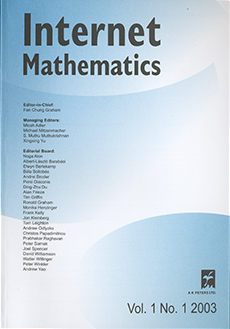Abstract
There is much current interest in the evolution of social networks, in particular, the World Wide Web graph, through time. ``Preferential attachment'' and the ``copying model'' are well-known models that explain the observed power-law degree distribution of the graph reasonably well. However, existing evolution models do not include the significant influence of search engines on how webpage authors find existing pages and create links to them. Recent applied work has raised the concern that highly popular search engines limit the attention of authors to a small set of ``celebrity'' URLs, for any query. Page authors frequently (with probability $p$) locate pages using a search engine. Then they link to popular pages among those they visit. We initiate an analysis of this more realistic process, show that the celebrity nodes eventually accumulate a constant fraction of all links created with high probability (whp), and show that the degrees of the other nodes still follow a power-law distribution, but with a steeper power: $\Pr(\mathrm{degree}=k)\propto k^{-(1+2/(1-p))}$ \whp. Our analysis adds evidence to the recent concern that search engines offer new webpages a steep, self-sustaining barrier to entry to well-connected, entrenched web communities.
Citation
Soumen Chakrabarti. Alan Frieze. Juan Vera. "The Influence of Search Engines on Preferential Attachment." Internet Math. 3 (3) 361 - 381, 2006.
Information




